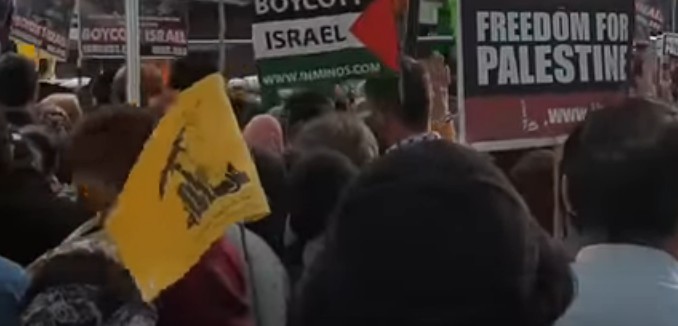If there is one lesson the world should have learned from Hezbollah’s 34 years of existence, it is this: Hezbollah has no distinct military and political wings.
Now, that false wall has begun to crumble.
On February 25, the British government announced its decision to designate Hezbollah as a terrorist organization in its entirety, a commendable — if not long overdue — move. Being a member of, or inviting support for, Hezbollah is now a criminal offense in the UK, carrying a sentence of up to 10 years in prison.
But not everyone sang the praises of the new law.
First, there was Jeremy Corbyn, Hezbollah’s propagandist-in-chief in the UK, whose office implied that the proscription was driven by political motives. The theocratic regime in Iran called the move “irresponsible.” And French President Emmanuel Macron declared, “France and no other power has the right to decide what Lebanese political parties are good and which are not.”
That’s a problem. Because unless the rest of Europe comes to its senses, Hezbollah will continue to spread its financial and ideological tentacles there, with devastating implications for both Europe’s security and the stability of the Middle East.
A full ban of Hezbollah by the European Union would deal a major blow to the organization. And don’t just take my word for it. Take the words of Hezbollah’s secretary-general Hassan Nasrallah.
A ban “would dry up the sources of finance,” Nasrallah said several years ago, “end moral, political and material support, stifle voices, whether they are the voices of the resistance or the voices which support the resistance, pressure states which protect the resistance in one way and another, and pressure the Lebanese state, Iran and Iraq, but especially the Lebanese state, in order to classify it as a state which supports terrorism.”
And yet, for over 30 years — ever since two suicide bombers killed 241 US Marines and 58 French soldiers in Beirut — the European Union has given Hezbollah an excuse to expand its nefarious activities by drawing a false distinction between the group’s political and military wings.
In reality, no such separation exists. Hezbollah does not see it. Lebanon — which to a large extent has morphed into Hezbollah – does not see it. America, Canada, Australia, New Zealand, the Arab League, and a growing number of European countries do not see it.
And again, don’t take my word for it. In 2009, Hezbollah’s deputy leader, Naim Qassem,told The Los Angeles Times: “We do not have a military wing and a political wing. … The same leadership that directs the parliamentary and government work also leads jihad actions in the struggle against Israel.” Four years later, a Hezbollah international relations official, Ammar Moussawi, reiterated the point: “Everyone knows that Hezbollah’s political and military wings are one and the same.”
The question is why European governments are in willful denial about this fact.
To some degree, Europe’s aversion is grounded in misguided post-colonial guilt. Emmanuel Macron spelled that out in his statement. Then there is the hard-left, with its romanticized concept of “resistance.” No terrorist or dictatorial regime is safe from Jeremy’s Corbyn’s sympathy. One man’s terrorist is another man’s freedom fighter, as the saying goes. And most importantly, perhaps, European governments are worried that a full proscription of Hezbollah could hinder political and diplomatic efforts to salvage the doomed 2015 nuclear accord with Iran.
After all, Iran is Hezbollah. Iran is the number one state sponsor of terrorism in the world and, by extension, so is Hezbollah. The organization threatens peace in Europe, undermines the stability of the Middle East, and has destroyed Lebanon as an independent country. The United Kingdom has led the way. Now Europe must follow, and bring down Hezbollah’s network of crime and terror.
[Photo: Israel Advocacy Movement / YouTube ]




